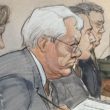Trick or Treat?—It’s fitting that it was Halloween when Senate Democrats held a secret meeting and hatched their plan to temporarily shut down the Senate so that the decision to go to war in Iraq could be fully examined, as promised. The invocation of the arcane “Rule 21” on November 1 surprised virtually everyone, not least of all Senate Majority Leader Bill Frist, who threw an impromptu temper tantrum for the press.
“We sat down and said, ‘How long are we going to wait,'” Senate Minority Whip Dick Durbin told CNN. Durbin said he asked Senator Jay Rockefeller (D-WV), Vice Chairman of the Senate Select Intelligence Committee, “‘Do you have any indication that the [committee] is going to keep its word to the American people to complete this investigation?’ And he said no. And we realized we had to take this extraordinary action.” It worked. The full Senate reconvened only after Frist named a bipartisan panel to issue a final “Phase 2” report into “whether intelligence was exaggerated or misused” by U.S. officials, a process the committee chairman, Pat Roberts (R-KS), had weeks earlier dubbed “a monumental waste of time.”
More important, the “shutdown showdown” signals that Democrats may be recovering from a bad case of Iraqnophobia—the fear of talking or doing anything about the mess in Iraq. Case in point: last week Senator John Kerry called on the Bush administration to withdraw the bulk of U.S. combat forces by the end of next year, starting with 20,000 over the holiday season. “It is time . . . to say so plainly and unequivocally,” Kerry remarked at an address at Georgetown University. If only he’d done so a year ago.
Scalito Supreme—Even before Judge Samuel Alito’s nomination to the Supreme Court, leading Democrats were determined to oppose it. “That is not one of the names that I’ve suggested to the president,” Senate Minority Leader Harry Reid said the morning before Bush tapped Alito. “I’ve done the opposite. I think it would create a lot of problems.”
The nomination has created problems—for Democrats. Almost immediately after the selection the Democratic National Committee was forced to defend a press release alleging that the Italian-American Alito was soft on the mob. Then Democrats began distancing themselves from Alito’s nom de guerre—”Scalito”—a reference to the current High Court’s staunchest conservative. Red-state Democrats such as Nebraska’s Ben Nelson expressed confidence that Alito would not “hammer away and chisel away on existing law.” The so-called “Gang of 14” moderates who brokered a compromise on judicial filibusters this year agreed that Alito did not yet qualify as an “extraordinary circumstance”—the new trigger for any filibuster. As usual the Republicans are largely united and the Democrats largely divided.
That’s partly because progressives lack even the language for opposing the court’s right-wing ideologues. While conservatives rant and rave about “strict constructionists” and judges “who won’t legislate from the bench,” Democrats retort with— your guess is as good as ours. “It’s not just that the conservative theory of constitutional interpretation is better than the liberal theory,” writes liberal columnist Michael Kinsley. “It’s that conservatives have a theory.” If Democrats don’t develop an opposition strategy and vocabulary in the next month, basic rights of ordinary Americans may be curtailed for the next twenty-five years.
Judges DeLay’d—Representative Tom DeLay is well known for railing against “an arrogant and out-of-control judiciary” and intemperately calling for the impeachment of federal judges. Now, indicted on criminal conspiracy and money laundering charges, DeLay is targeting the judges in his own case. On November 1, DeLay’s lawyers forced a successful motion to remove from the case presiding Judge Bob Perkins, who once donated to MoveOn.org.
District Attorney Ronnie Earle countered by moving to replace Perkins’s replacement, Judge B.B. Schraub, who has donated a total of $6,400 to state and federal Republican candidates since 1989. A successor to Schraub was then chosen by Texas Supreme Court Judge Wallace Jefferson, an appointee of Republican Governor Rick Perry, a close ally of DeLay in the 2002 state redistricting takeover. Finally, both sides agreed that a retired judge from San Antonio would hear the case. Only Tom DeLay could go through four judges before his case even goes to trial.
Meanwhile back in Washington, DeLay addressed the conservative Heritage Foundation on “Action and Accountability: Restraining Spending and Redesigning Government”—one indictment at a time?





0 Comments